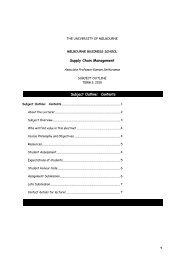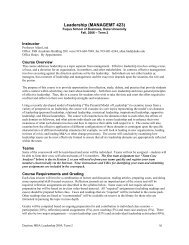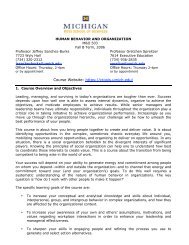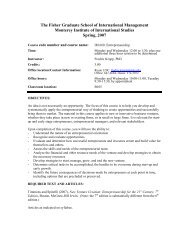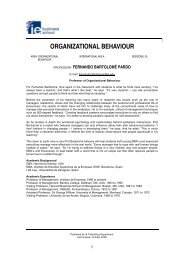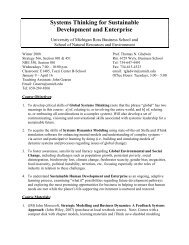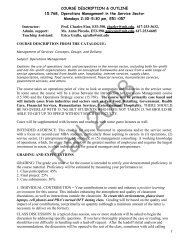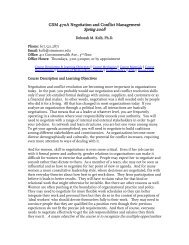behavioral decision making: biases, heuristics and errors.
behavioral decision making: biases, heuristics and errors.
behavioral decision making: biases, heuristics and errors.
You also want an ePaper? Increase the reach of your titles
YUMPU automatically turns print PDFs into web optimized ePapers that Google loves.
MATERIALS<br />
The readings will be provided via a course pack <strong>and</strong> these will be the main source of<br />
materials in the course. These readings will include chapters from popular textbooks<br />
addressing managerial judgment <strong>and</strong> <strong>decision</strong> <strong>making</strong>, articles from the psychology <strong>and</strong><br />
<strong>behavioral</strong> economics literatures, <strong>and</strong> articles from the popular press.<br />
METHODOLOGY<br />
The course will rely on a range of methods including discussion-oriented lectures, experiential<br />
<br />
everyone will complete an on-line <strong>behavioral</strong> assessment. This will provide a source of<br />
throughout the course to make <strong>behavioral</strong> concepts<br />
concrete. This data will be augmented by in-class <strong>behavioral</strong> simulations that will offer<br />
additional insights into <strong>decision</strong> <strong>making</strong> challenges, successes <strong>and</strong> failures.<br />
While there will be some variation from session to session, there will be a common format:<br />
1. Situations: We will address one or more commonly faced judgment <strong>and</strong> <strong>decision</strong> <strong>making</strong><br />
(JDM) situations using a mini-experiment, simulation, assessment, or set of readings.<br />
2. Data & Interpretation: We will examine the data from the class <strong>and</strong>/or a set of reference<br />
groups to analyze behavior: how well do people perform in these JDM situations<br />
3. Explanation & Underst<strong>and</strong>ing: We will draw on concepts <strong>and</strong> ideas from the psychology of<br />
judgment <strong>and</strong> <strong>decision</strong> <strong>making</strong> <strong>and</strong> from <strong>behavioral</strong> economics (<strong>and</strong> occasionally,<br />
neuroeconomics) to better underst<strong>and</strong> why people behave as they do.<br />
4. Application<br />
arise in business contexts such as general management, strategy, marketing, finance, <strong>and</strong><br />
entrepreneurship.<br />
5. Improvement<br />
<strong>and</strong> <strong>decision</strong> <strong>making</strong> performance. How can we avoid <strong>biases</strong>, <strong>errors</strong> <strong>and</strong> failures<br />
PROGRAM<br />
In terms of workload, for each session you should expect to read one or two short book<br />
chapters (or chapter excerpts), one or two management-oriented papers, <strong>and</strong> one or two brief<br />
articles from the popular press. To help you determine how much time/effort to put into each<br />
reading, I have marked each reading according to the Key below.<br />
KEY:<br />
[Q] Quick readings, usually from popular press or websites. These are intended to<br />
provide background <strong>and</strong> to get you thinking about real-world situations <strong>and</strong><br />
applications.<br />
[R] Read fully <strong>and</strong> carefully. These are the core readings for the session <strong>and</strong> you<br />
should come to class prepared to talk about them.<br />
[E] Read/skim to Extract primary concepts. These will usually be papers presenting<br />
the results of <strong>behavioral</strong> experiments. Read the Introduction, <strong>and</strong> focus on<br />
extracting main ideas from the Results <strong>and</strong> Discussion sections of the papers.<br />
[X] Extra readings you should consider if the topic is of particular interest to you.<br />
The numbers given after each code in the reading lists below denote the approximate<br />
<br />
3 |




